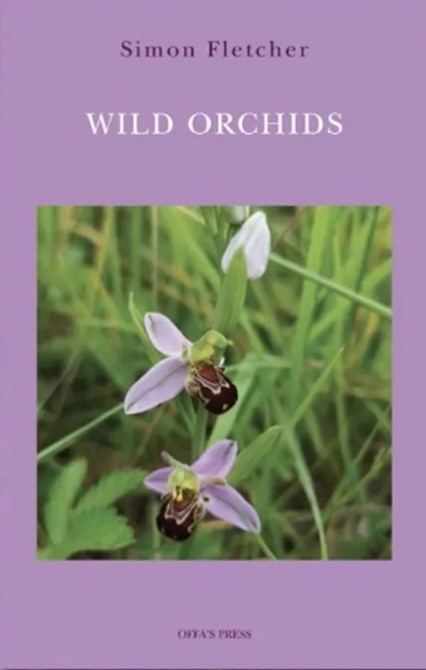REVIEW: SIMON FLETCHER’S ‘WILD ORCHIDS’
By Stella Backhouse

In poetry terms, the Shropshire town of Oswestry has only one claim to fame – but it is an impressive one: Wilfred Owen, regarded by many as the pre-eminent poet of World War One, was born there in 1893. Any modern collection inspired by the town is probably contractually-obliged to pay its dues to Owen at some point, and Simon Fletcher’s environmental collection Wild Orchids stumps up early. Surveying the local landscape Fletcher muses in his opening poem that “It’s often said that poets go to war/to save their homes,/the people, language, place,/but I find love in all diversity,/I’ll happily fight for this”.
In reality, Fletcher’s call to arms is a fairly gentle one. The ghost of Owen is summoned again in the second poem, with its shout-out for “briefly, Owen’s oil tanker!”; meanwhile a later poem about ash dieback disease has an opening line (“The ash tree in my neighbour’s garden’s sick”) that recalls “On Wenlock Edge the wood’s in trouble” from Shropshire’s other enduring contribution to the English poetic canon, A.E. Housman’s A Shropshire Lad (which also achieved huge popularity during World War One). But mostly these are evocative and celebratory poems about a landscape with which Fletcher is intimately familiar. His message centres on the contrast between the profusion, interconnectedness and infinite adaptations of the wild ecosystems he loves and the sterile uniformity of modern arable; overall, however, his anger seems implied rather than fulsome.
The most visceral exception is ‘Badger’, a difficult read for anyone distressed by animal suffering, but for me the book’s most haunting poem. Finding a dead badger, Fletcher at first assumes it’s roadkill, “its face a mess of blood and pain/a sacrifice to gods of speed” but then realises it could be a victim of savage illegal ‘sport’: “after a baiting was he dumped,/heaved from the back of a 4X4?/Did slim dogs harass, bite, torment/his soul for gamblers’ pleasure/gain?”.
Following such a raw and unflinching confrontation with the abyss that is human abuse of nature, Fletcher’s conclusion that “the shape of death is all too clear,/familiar scene, we drive off, quick” at first struck me as rather limp; but on reflection, I think perhaps it is meant as metaphor for our self-deluding preference to avoid the realities of environmental destruction. I also enjoyed the graphic starkness of ‘Hedge’, where breathless lines of brimming ecosystem are sandwiched between the bald “I’m standing in the gap” and “where the hedge once was”.
Taking the worked-out Dolgoch Quarry in the hills south of Oswestry as a real-life illustration, Fletcher’s urging is that if we stop looking away, we can reverse the destruction and use re-wilding to re-introduce the diversity he believes is essential to planetary well being. Now a nature reserve rich in butterfly and plant life, the quarry is the setting for many of his poems. He acknowledges that its reversion to nature is down to hard-nosed economic forces – “There’s little truly wild about this place;/it lives and breathes because abandoned years/ago when markets undercut the need/for stone from here” – but still celebrates the process by which “slowly it becomes a version of/its former self, a quiet green retreat,/an island of diversity among/the monoculture farms”.
Both ‘A passing thought’ and ‘Last Cuckoos’ express Fletcher’s sadness at species loss occurring almost before his eyes; in the latter, he expands his profusion/sterility dichotomy to include the spiritual barrenness of economic activity. Using the example of his own life, he remembers how cuckoos “were just there in my childhood,/a much-mocked but familiar chime…a song more than a bird”. After years city working, when the birds were “some thing I never thought about/in the dull exchange of work for goods” he returns to the countryside to find that their numbers have dramatically declined; and in a plea to re-think our priorities, laments that “if we don’t give them room, by choice,/and carry on this dull exchange,/we’ll find ourselves without a voice”.
The war to save the planet is still awaiting, perhaps, its own Wilfred Owen – for me, Fletcher just isn’t angry enough. But in these little hymns to a favourite corner of Shropshire, he sketches out a possible path to pulling back from the brink – if we choose to take it.
Wild Orchids is available to purchase online direct from publisher Offa’s Press, as well as other bookshops and retailers.
